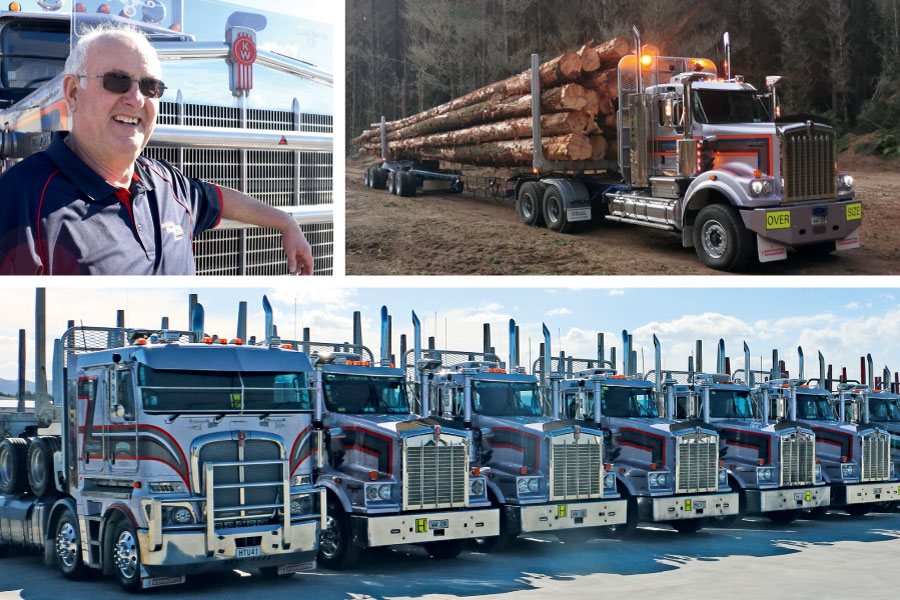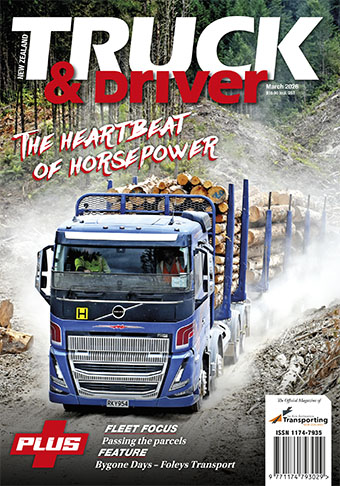Southpac Legends


Under the Radar - Peter Withington
Southpac Legends
Celebrating over a half century in engineering and the last twenty-five years of that with Williams & Wilshier, you could say that Peter Withington has seen it all. However this modest engineer whose philosophy is to ‘always put back into the Industry’ has throughout all these years, managed to stay under the radar - that is until now thanks to Southpac Trucks Legend series..
Peter’s first real encounter with an engine came when he was still at school. His father was a hotel manager in Milford Sounds and one of the tractors that frequented the Milford track reported a faulty clutch. Peter says, “a guy, Bruce Hoffman was his name, came all the way from his shop in Invercargill to fix it. I went up with him to work on this Fergie 28 tractor. It was a really interesting exercise. Turned out it wasn’t the clutch but the guy knew how to solve the issue - I became interested in engineering there and then.”
At that stage Peter didn’t have any idea as to what he wanted to do when he left school, so he took up an apprenticeship as a diesel mechanic and the same Bruce Hoffman gave him a start.
Peter says, “Bruce worked on all sorts of things. He sold and serviced RT radios, he overhauled and reconditioned dental drills and we had our own fuel shop where we overhauled injectors and fuel pumps, we did a bit of everything.”
One of the bigger projects Peter did at that time was look after the diesel generators on Stewart island.
...Celebrating over a half century in engineering and the last twenty-five years of that with Williams & Wilshier, you could say that Peter Withington has seen it all. However this modest engineer whose philosophy is to ‘always put back into the Industry’ has throughout all these years, managed to stay under the radar - that is until now thanks to Southpac Trucks Legend series..
Peter’s first real encounter with an engine came when he was still at school. His father was a hotel manager in Milford Sounds and one of the tractors that frequented the Milford track reported a faulty clutch. Peter says, “a guy, Bruce Hoffman was his name, came all the way from his shop in Invercargill to fix it. I went up with him to work on this Fergie 28 tractor. It was a really interesting exercise. Turned out it wasn’t the clutch but the guy knew how to solve the issue - I became interested in engineering there and then.”
At that stage Peter didn’t have any idea as to what he wanted to do when he left school, so he took up an apprenticeship as a diesel mechanic and the same Bruce Hoffman gave him a start.
Peter says, “Bruce worked on all sorts of things. He sold and serviced RT radios, he overhauled and reconditioned dental drills and we had our own fuel shop where we overhauled injectors and fuel pumps, we did a bit of everything.”
One of the bigger projects Peter did at that time was look after the diesel generators on Stewart island.
He says, “because there was no power in those days, we’d go over there to do service and repairs and then do the same thing up in Fiordland and places like that. It was a really broad apprenticeship.”
Broad indeed, however, with the apprenticeship over, Peter left for Auckland and got a job through his brother in law with Cook Motor Racing in Manurewa where he maintained performance cars and built engines, the company used to race the cars too. Peter stayed there for around two years before moving on to Industrial Steel Plant in Penrose.
He says, “they were the NZ agents for ERF Trucks, Cummins engines and Wabco Earthmoving gear and one other agency that was really interesting, Liebherr Tower cranes. I worked there for a number of years, moreso in the truck and machinery side and then I moved with them to Hamilton to work semi-autonomously.”
His work had him covering most of the Waikato region and he enjoyed the freedom of self-management but then moved on to International Harvester who sold International trucks and then onto a private company called Purdy and Sherson that were in to earth moving and roadworks.
But it was his next move to Murupara in the Kaingaroa forest, that elevated him to management status and gave him a chance to ‘give back to the industry’ by employing his own apprentices.
Initially working with Direct Transport as a workshop manager Peter and his family lived out in Murupara for a number of years, even commuting to the small town when the family moved to Rotorua.
Thankfully, Direct Transport moved into town and Peter moved with them before taking up a role with (what turned out to be) Southpac Trucks. He says, “I worked there as a Foreman to start with, then Service Manager for quite a few years. It was a big operation about sixteen mechanics and apprentices at one stage, then I was approached by Warwick Wilshire, he asked if I wanted a job. That was about twenty five years ago.”
As it turned out, Peter needed a bit of a change, so he joined Williams & Wilshier and has been there ever since. So, having such a broad background, travelled the length and breadth of the country and worked for a multitude of organisations, why did Peter remain at Williams & Wilshier?
“I haven’t had the need to move on, I haven’t seen anything better.” He jokes. “It’s changed a bit obviously since I started here. When I began there were about ten or twelve trucks, now we’ve got close to nearly a hundred.”
He reckons that the industry has changed alot too, now it’s all controlled by electronics. Peter says, “you’ve got to be computer literate to work on engines, trucks and trailers nowadays. You plug in and find out why things like the ABS are not working. You can’t fix things without plugging in.”
He also says that the parts are more ‘disposable’ now.
“Once upon a time you’d take a water pump off. Dismantle it on the bench, assemble and put it back on. Now you just go and buy a water pump and bang it on. That’s the unfortunate thing, a lot of the old skills are lost. You don’t recondition cylinder heads like we used to when I was at Cummins.”
It’s not just the workload that’s changed, according to Peter the industry appeal to staff and work ethic has too.
“The difference is that in the early days people wanted to work, people don’t want to work that hard nowadays. I still regularly come to work on a Saturday because that’s what I’ve done all my life but you don’t see that much in the younger people now. They want a job that starts on Monday morning and finishes on Friday afternoon but in our industry we’ve got to have our workshop open Saturday morning to keep up with what we’ve got going on.”
In saying that, Peter has employed a huge amount of engineers over his career and he continues to employ apprentices.
“Everywhere I’ve been we’ve always had apprentices and some places two, three or four at a time, continually adding to the industry. We’ve always got to put back something because it’s very hard to find people to do this job now, younger people want to play around with computers or office work, no weekend or after hours work, so we’ve got to put something back.”
Peter also tries to make the working conditions the best as possible and look after the people the best way he can. He says it encourages people to stay and encourages people to want to come and work there.
“I do get on well with the guys out there, they’re basically all my mates too. We joke and laugh, it’s about making the place a good place to work. We have a very low staff turnover. The whole Williams & Wilshier company is a good company to work for.”
He also reckons that a lot of people are surprised at how easy the owner Warwick is to talk to.
“He’ll tell the guys a lot about what’s going on. He’ll tell them about the industry as a whole and really include them.”
Williams & Wilshier currently have six mechanics for their fleet of trucks and trailers.
“We generally do all our own gearboxes and diffs. We do as much as we can and depending on how busy we are, sometimes we send things back to the dealer. If there’s any major engineering stuff needed on the trailers they go to Patchell Industries.”
And despite the ever changing industry, Fleet Service Manager Peter stays on top of things.
“I always say that I know a bit about everything and that gets me through.”
Although he’s been in the industry since the age of sixteen and has happily ‘flown under the radar’ sixty-six-year-old Peter says he’s basically near the end of his career.
“I might stay on for a couple more years yet hopefully, it’s a good place to be so I might as well stay. When I retire I’ve got a lifestyle block with some work to do on that.”
Maybe Peter will buy an old Fergie 28 and work on that too.



 + EQUIPMENT GUIDE - FREE
+ EQUIPMENT GUIDE - FREE
